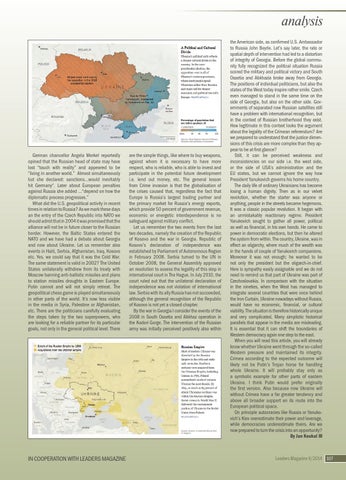analysis
German chancellor Angela Merkel reportedly opined that the Russian head of state may have lost “touch with reality” and appeared to be “living in another world.” Almost simultaneously but she declared: sanctions...would inevitably hit Germany“. Later about European penalties against Russia she added …“depend on how the diplomatic process progresses.” What did the U.S. geopolitical activity in recent times in relation to Russia? As we mark these days an the entry of the Czech Republic into NATO we should admit that in 2004 it was promised that the alliance will not be in future closer to the Russian border. However, the Baltic States entered the NATO and we have had a debate about Georgia and now about Ukraine. Let us remember also events in Haiti, Serbia, Afghanistan, Iraq, Kosovo etc. Yes, we could say that it was the Cold War. The same statement is valid in 2002? The United States unilaterally withdrew from its treaty with Moscow banning anti-ballistic missiles and plans to station missiles droughts in Eastern Europe. Putin cannot and will not simply retreat. The geopolitical chess game is played simultaneously in other parts of the world. It’s now less visible in the media in Syria, Palestine or Afghanistan, etc. There are the politicians carefully evaluating the steps taken by the two superpowers, who are looking for a reliable partner for its particular goals, not only in the general political level. There
IN COOPERATION WITH LEADERS MAGAZINE
are the simple things, like where to buy weapons, against whom it is necessary to have more respect, who is reliable, who is able to invest and participate in the potential future development i.e. lend out money, etc. The general lesson from Crime invasion is that the globalisation of the crises caused that, regardless the fact that Europe is Russia’s largest trading partner and the primary market for Russia’s energy exports, which provide 50 percent of government revenue, economic or energetic interdependence is no safeguard against military conflict. Let us remember the two events from the last two decades, namely the creation of the Republic of Kosovo and the war in Georgia. Republic of Kosovo’s declaration of independence was established by Parliament of Autonomous Region in February 2008. Serbia turned to the UN in October 2008, the General Assembly approved an resolution to assess the legality of this step in international court in The Hague. In July 2010, the court ruled out that the unilateral declaration of independence was not violation of international law. Serbia with its ally Russia has not succeeded, although the general recognition of the Republic of Kosovo is not yet a closed chapter. By the war in Georgia I consider the events of the 2008 in South Ossetia and Abkhaz operation in the Kodori Gorge. The intervention of the Russian army was initially perceived positively also within
the American side, as confirmed U.S. Ambassador to Russia John Beyrle. Let’s say later, the rate or spatial depth of intervention had led to a distortion of integrity of Georgia. Before the global community fully recognized the political situation Russia scored the military and political victory and South Ossetia and Abkhazia broke away from Georgia. The positions of individual politicians, but also the states of the West today inspire rather smile. Czech even managed to stand in the same time on the side of Georgia, but also on the other side. Governments of separated now Russian satellites still have a problem with international recognition, but in the context of Russian brotherhood they exist. How legitimate in this context looks the argument about the legality of the Crimean referendum? Are we prepared to understand that the justice dimensions of this crisis are more complex than they appear to be at first glance? Still, it can be perceived weakness and inconsistencies on our side i.e. the west side, or the side of USA’s administration and the EU states, but we cannot ignore the way how President Yanukovich governs his home country. The daily life of ordinary Ukrainians has become losing a human dignity. Then as in our velvet revolution, whether the starter was anyone or anything, people in the streets became hegemons. It was a classic popular revolution. It began with an unmistakably reactionary regime. President Yanukovich sought to gather all power, political as well as financial, in his own hands. He came to power in democratic elections, but then he altered the system from within. The country, Ukraine, was in effect an oligarchy, where much of the wealth was in the hands of couple of Yanukovich companions. Moreover it was not enough; he wanted to be not only the president but the oligarch-in-chief. Here is sympathy easily assignable and we do not need to remind us that part of Ukraine was part of Czechoslovakia. In comparison with the situation in the nineties, when the West has managed to integrate several countries that were once behind the Iron Curtain, Ukraine nowadays without Russia, would have no economic, financial, or cultural viability. The situation is therefore historically unique and very complicated. Many simplistic historical parallels that appear in the media are misleading. It is essential that it can shift the boundaries of Western democracy again one step to the east. When you will read this article, you will already know whether Ukraine went through the so-called Western pressure and maintained its integrity. Crimea according to the expected outcome will likely not be Putin’s Trojan horse for handling whole Ukraine. It will probably stay only as a symbolic example for other parts of eastern Ukraine. I think Putin would prefer originally the first version. Also because now Ukraine will without Crimea have a far greater tendency and above all broader support en its route into the European political space. On principle autocracies like Russia or Yanukovich’s Kiev overestimate their power and leverage, while democracies underestimate theirs. Are we now prepared to turn the crisis into an opportunity? By Jan Koukal ■
Leaders Magazine II/2014 107
